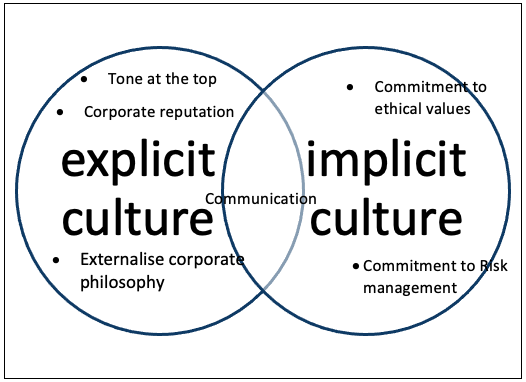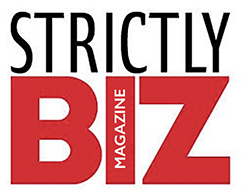STRICTLY BIZ MAGAZINE JULY / SEPTEMBER 2021
TWO CORPORATE ETHICAL CULTURE STRATEGIC APPROACHES TOWARDS ‘DOING THE RIGHT THING’
Introduction
In this article, I share my research findings on how corporations could practice doing the right thing. This article aims to introduce a corporate ethical culture model that provides insights for corporations to instill an ethical culture in business. The corporate ethical culture model deliberates ethical culture as a foundation of a business model that can influence operational practices in creating and sustaining business. In particular, the article describes the two strategic approaches, namely explicit form and implicit form of corporate ethical culture.
Ethical Culture
In a straightforward expression, ethics means doing the right thing. On the other hand, ethical culture means doing the right thing in respects of belief and norms comprised of good values. Quote from the respondent's voice “we want to have a high-performance culture within our organization, which means we choose the right people, right function, right qualification”. The question is, do Malaysian companies do the right thing? Taking this question forward, I would like to share my research finding on how Malaysian corporations could demonstrate doing the right thing through integrating ethical culture. I have developed an ethical culture model that deliberates how corporations could use two strategic approaches to do the right thing.
Creating Ethical Culture Model
In this section, I deliberate how corporations could adopt the two approaches of doing the right thing, i.e., integrating ethical culture in their organizations. First, it is important to note that the model was developed based on a systematic methodology process.
The finding of my study showed that creating corporate ethical culture is associated with the beliefs and norms in an organisation. Also, creating ethical culture is one of the key foundations of every business as internalising the beliefs and norms is a way of life in the organisations. Example of quote that express as such: ‘…ethics is a way of life’…. ‘what is led, shown and seen is culture’.
Interestingly, I found there are two approaches that infer how organization can integrate ethical culture in business i.e. engaged to influence operational practices in business. The two approaches are: 1) explicit way of belief and norms and 2) implicit ways of belief and norms. The key to the explicit and implicit ethical culture is that both approaches should promotes ethical behavior. Most importantly, the two approaches require commitment from the corporate citizen. Figure 1 depicts the two approaches.
Figure 1: Creating Ethical Culture Business Model

Approach 1: Explicit ethical culture
Explicit ethical culture means formal way of integrating ethical culture, which means corporations develop ethical culture that is visible. In a simple word, that ethical measure that can be easily seen. Table 1 depicts how organisation can do so, make ethical culture visible.
Externalise corporate philosophy – Display corporate philosophy such as ethical statement. Make is visible and practiced. For example:
- display ethical motto at the entrance of the building.
- Take pride in displaying your organisation ethical values to show commitment and pride in ethical conduct.
- Highlight the vision and mission of the company.
- Commit to social responsibility as part of ethical belief and norms.
Tone at the Top -Tone at the top must make ethical culture explicit addressing support for ethical behavior. Follow are some examples:
- The responsiveness of top management towards ethical considerations and conduct is one of the key corporate traits that is cultured in the organisations.
- Openness and commitment from the leaders are crucial.
- Exemplary leadership
Corporate Reputation- lived up to the organisation good reputation. Ethical organizations display their ethical behaviour explicitly and reputation leads to sustainability.
Approach 2: Implicit ethical culture
Implicit ethical culture means informal ethical culture. The ethical culture that promote informal ethical conduct and impedes unethical conduct. Some of the components of implicit ethical culture include: 1) cultivate ethical values and 2) risk management practice
- Commitment to cultivate ethical value - loyalty, openness, trustworthiness, due diligence, honesty are the categories instilled in organisations. Loyalty to and from shareholders, for example.
- Commitment to risk management- managing risk is an implicit form of ethical culture in business practices. Corporations should consider risk management as serious as it is associated with the sustainability of the corporations. Pressure from stakeholders encourages corporations to seriously consider risk when deliberating corporate governance practices. Make it a norm to manage risk in making all business decision.
Communication- Communicating ethical values is crucial. Proper communication of ethics can be translated into ethical actions. A lack of moral values contributes towards its lack of ethical awareness. Thus, instilling work ethics in organisation should be made priority in an organisation.
Conclusion
The ethical model shown in diagram 1 contributes to an identification of two strategic approaches of corporate ethical practices in doing business. There are many more, the above-mentioned are some of the example corporations can adopted. This model is the principal contribution of this article providing guidance to corporations towards ethical business practices. The model is derived from two generic dimensions: the context of application and the application of content, thus support the practical aspects of the model in the business environment.
u

